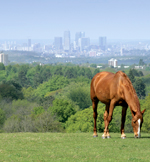Need to Know: Adverse possession of land
If you’re using someone else’s land without official permission you could qualify for adverse possession


‘Adverse possession' is the more legally precise term for (the arguably less elegant, but better known) ‘squatting'. It was late, great George Bernard Shaw who said that "property is organised robbery" and nowhere does the truth of this lie closer to the surface, than when looking at the rules that govern adverse possession. The rules have changed with the advent of the Land Registration Act 2003 but the principle is still the same: if you are able to demonstrate sufficient occupation of the land for a sufficiently long time, you will be granted title to it, notwithstanding that it was never formally sold or given to you. Only the ‘true' owner can, in certain circumstances, defeat your claim.
Although there is the occasional case like Harry Hallowes', tramp extraordinaire and business genius, who, in 2008, managed to acquire title to a plot of garden land in London worth £4 million, by camping on it for 21 years, this is most extreme end of adverse possession cases. Much more frequently, it is the case that a landowner's stock are allowed onto neighbouring, unused land to graze it and in time, this is fenced and taken in as part of the existing property. Apparently unused land adjoining existing gardens or houses, is also often planted over by the neighbouring owner to improve their view: in time, their view is that the land now forms part of their property. Land mistakenly thought to belong to properties can also be the subject of adverse possession, where a boundary is unclear and it has always been treated as part of the property.
* For more news stories like this every week subscribe and save
There are three essentials for claiming adverse possession of land: first, that you have been in factual possession of the land; secondly, that you have had the necessary intention to possess it and thirdly, that your occupation has been without the owner's consent. These are largely determined on the facts of any one case and common sense. You need to demonstrate a ‘sufficient degree of exclusive physical control' and what this is, will obviously depend on the nature of the land in question: for example, planting flowers or grazing a pony on it, could both count as sufficient acts of possession. Fencing and erecting locked gates, mowing, clearing and planting are also all good examples - planting a lone, failed bonsai, amidst a mass of shoulder-high nettles, is not (and yes, that was once suggested to me). Finally, your occupation must have been without consent of the landowner. Consent can be formal, such as a licence to occupy, or informal, such as a letter, or even conversation, saying that you can use the land.
If the land you seek to claim is registered (check by carrying out a ‘search of the index map' at the Land Registry), you will need to have occupied it for at least ten years. If it is unregistered, you need twelve years' adverse possession. There are also transitional provisions for cases where you have acquired twelve years' adverse possession of registered land before 13 October 2003 - this is when the 2003 Act came into force and changed the rules. Not just to create work for myself, but it really is worth seeing a solicitor and seeking professional advice.
Assuming you fulfil the criteria, you need to make an application to the Land Registry to be registered as the new owner, based on your adverse possession. You will need to write a statement setting out the history and circumstances of your occupation. Please note the sting in the tail: notice of your application will be served on the current owner of the land (if known) and the effect of this on neighbourly relations should be considered! If successful, you will be registered with possessory title, which can be converted into full title after a further twelve years.
If, however, you are the landowner, a good tactic to put off would-be squatters, is to offer them a licence, tenancy or other permission to use your land. Similarly, installing fences, locked gates and animals can dampen enthusiasm. Voluntary first registration of your land is also worth considering, if it is not already registered. Knowing precisely what you own and having that registered, makes it much easier to be clear about when someone else is encroaching on it.
Exquisite houses, the beauty of Nature, and how to get the most from your life, straight to your inbox.
The bottom line is this; having paper title to your land is not sufficient, you must also continue to assert your title. Now what more motivation could you need, to go and mow the lawn?
About Elizabeth
Despite being one who feels the cold, Elizabeth braved a move to Northumberland and has worked there as a solicitor with the firm of Dickinson Dees LLP, in the Agriculture, Farms and Estates Team, where she started life as a trainee in 2003. As part of this specialist and nationally renowned team, she works both for a number of larger estates and trusts on an ongoing basis and also on one-off matters, covering the range of rural property law, including; sales and purchases, sporting rights,rights of way, easements and tenancies, to name a few. Outside the office, she nearly managed to get sent to the North Pole, loves the occasional hunt with the CVNNH and continues to try and break the 4-hour mark for a marathon. She lives with her husband, a terrier and a very silly basset.
She can be contacted through Dickinson Dees on 0191 279 9000
Country Life is unlike any other magazine: the only glossy weekly on the newsstand and the only magazine that has been guest-edited by His Majesty The King not once, but twice. It is a celebration of modern rural life and all its diverse joys and pleasures — that was first published in Queen Victoria's Diamond Jubilee year. Our eclectic mixture of witty and informative content — from the most up-to-date property news and commentary and a coveted glimpse inside some of the UK's best houses and gardens, to gardening, the arts and interior design, written by experts in their field — still cannot be found in print or online, anywhere else.
-
 A very taxing quiz indeed: Country Life Quiz of the Day, November 26, 2025
A very taxing quiz indeed: Country Life Quiz of the Day, November 26, 2025Test your general knowledge in today's Quiz of the Day.
-
 Space, seclusion and indulgence: Arranging a luxury villa experience with One&Only and Carrier
Space, seclusion and indulgence: Arranging a luxury villa experience with One&Only and CarrierVillas and private homes offer privacy, peace, space and top-end resort facilities when you want them — particularly if you opt for one of the choices within the One&Only collection, as curated by the experts at Carrier Luxury Holidays.
